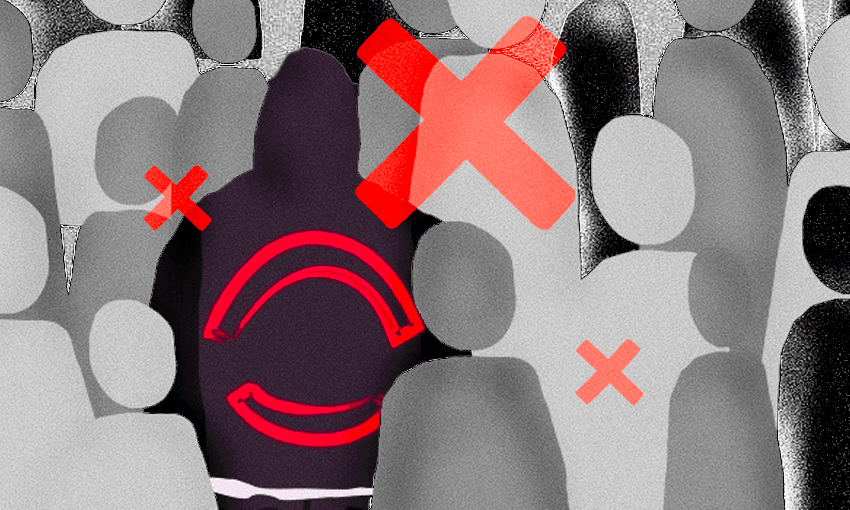New legislation to prohibit gang insignia in public places will be passed into law in the coming weeks, even if it’s deemed inconsistent with the Bill of Rights. How it will be interpreted in the courts is another matter, writes Andrew Geddis.
I hear that the new coalition government is going to make gangs disappear! How will it manage that?
Well, maybe not “disappear” as such. However, it is proposing legislation to “ban all gang insignia in public places [and] create greater powers to stop criminal gangs from gathering in groups and communicating”, with the intention of “reduc[ing] gangs’ ability to engage in criminal behaviour and prevent them from further endangering and intimidating Kiwis”.
Ah! Kind of an ‘out of sight, out of mind’ deal, then?
I guess so. The argument would seem to be something along the lines that gangs rely on their public branding and numerical power to operate, so taking this away will make them less effective and attractive for others to join.
There’s a sort of surface logic to that … but will it work?
Dunno. Lots of people have expressed their doubts, including Chester Burrows, the MP who sponsored local legislation back in 2007 that purported to allow a ban on gang patches in Whanganui’s public places. Others issuing similarly downbeat assessments include the opposition parties, legal academics, and gang members themselves. And while broadly supporting the government’s policies, the head of the Police Association, Chris Cahill, also admits that “the ability to police [the ban] in some communities will be much more difficult than others”.
What’s that about Whanganui? Have we tried this before?
Yes – sort of. Back in 2007, parliament passed legislation that allowed the Wanganui District Council (as it was then) to make bylaws to ban gang insignia in designated public places in order to prevent the public from being intimidated. However, the council’s subsequent bylaw effectively created a blanket ban on displaying gang insignia in all public places in the Whanganui district. Following a legal challenge, the high court found that the extent of this ban exceeded the powers that parliament had devolved through its legislation. The bylaw thus was of no legal effect, and a new council opted not to replace it with something more narrowly tailored.
Then, in 2013, parliament passed the Prohibition of Gang Insignia in Government Premises Act 2013, which pretty much does what it says on the lid. Under this enactment, it is an offence to “display gang insignia at any time in government premises”. Anyone doing so can be arrested and fined up to $2,000, while any gang insignia that has been displayed in the premises can be seized and destroyed.
I’m a bit confused. A ban on gang patches in Whanganui was not lawful, but the current ban on gang patches in all government premises is lawful?
Yes, because of the way each ban was imposed. The Whanganui ban was imposed by the council using legal powers given to them by MPs. Because those legal powers were exceeded, the ban was “ultra vires” and so invalid. In comparison, the government premises ban is contained in primary legislation enacted by MPs directly. Because parliament can pretty much do what it wants with the law, no one can say this legislation is invalid.
So, if the government gets parliament to impose a blanket ban on gang insignia in all public places, that makes everything OK?
Well, it would make it legally effective (subject to any issues with interpreting and enforcing the legislation). But … there is a but. Any bill that goes before parliament must be assessed by the attorney general (the government minister in charge of ensuring the government abides by its legal obligations) for consistency with the New Zealand Bill of Rights Act 1990 (NZBORA). Basically, she – Judith Collins currently holds this office – has to determine whether the bill limits one of the rights guaranteed by this legislation; and if so, whether that limit can be “demonstrably justified in a free and democratic society.” If she thinks a rights limit cannot be so justified, then she must tell parliament of her conclusion through a “section 7 notice”.
Why might this be an issue for legislation banning the wearing of gang insignia in public?
Because prohibiting someone from displaying “insignia” due to how it is perceived limits the right to freedom of expression. In addition, the proposed legislation’s provisions empowering the police to “issue dispersal notices, which will require gang members to immediately leave the area and not associate with one another for seven days” also limits the rights to associate and peacefully assemble. That means the attorney general is going to have to decide if these limits are demonstrably justified in terms of their objectives and the way that those objectives are being achieved.
It’s important to note that this analysis won’t just be Judith Collin’s own personal reckons, based on what her gut tells her. Rather, she gets advice from government lawyers about how courts have approached this demonstrably justified test in previous cases and how that legal analysis applies in this situation. She can then accept or reject that advice – the final call is hers – but it’s more than simply “do I like what’s being proposed?”
What is the attorney general likely to say about that issue?
That’s unclear, in part because we don’t exactly know what the bill will say! However, past assessments of rights limits in relation to this issue have reached mixed conclusions. Let’s just say for now that there’s at least a 50-50 chance that Collins will conclude the rights limits are not justified and so issue a section 7 notice, informing parliament that the proposed legislation is inconsistent with the NZBORA.
So the proposed gang bill might be declared inconsistent with the New Zealand Bill of Rights? If so, surely that’s a big deal?
Sort of, yes. But also, not really. A section 7 notice from the attorney general only records her conclusion that the relevant rights limits haven’t been adequately justified (based on how this legal test has been understood and applied previously). Whether MPs – or more accurately, government MPs who have the majority in parliament – take any notice is another matter. On that front the minister of justice, Paul Goldsmith, has stated that “we campaigned on bringing in these policies, we’ve been elected, the Cabinet’s made the decisions, we’ve prepared the legislation and we’re going to do what we said we’re going to do”.
He can take this stance because section 7 notices don’t impose any additional restrictions on parliament’s law-making powers. They do have to be sent to select committee along with the bill, assuming that this stage isn’t skipped under urgency. But the decision on whether the rights limit is or is not justified ultimately is left to MPs to decide, just as they do any other policy issues with proposed legislation.
So a section 7 notice from the attorney general is worth … what, exactly?
It really depends on the issue at hand. Let’s just say that while everyone may have rights, the rights of some are more important than others. Legislation that limits the rights of socially unpopular groups like gangs won’t attract the sort of concerned attention that apply to measures that limit the rights of more “worthy” groups. Indeed, the legal academic Paul Rishworth has speculated that getting a section 7 notice attached to some bits of legislation represents a “badge of honour” in that it announces to the world that the government is really serious about cracking down (or similar rhetoric).
After all, the idea of a section 7 notice is to be a “red flag” warning MPs they are being presented with a proposed law that unjustifiably limits some individual right regarded as important enough to be recognised in the NZBORA. The hope was that should MPs then pass this law, the voting public would be so outraged that those MPs would pay a political price for their decision. But, what if the majority of the voting public don’t notice? Or, don’t really care? Or, even applaud the decision? Then the section 7 notice loses any power.
Are you saying that individual rights and how these are perceived and valued is socially conditioned and subject to systemic prejudices?
Yes. Yes I am.
Bleak. Where is all this going to end up?
Well, the bill is going to get introduced and passed into law irrespective of any NZBORA assessment. There’s no way that the coalition government is going to back down on it, given that every news cycle carrying the message “government cracks down on gangs” is exactly what they want the median voter to hear. Which means that the real issue isn’t the general policy – that’s a fait accompli – but rather the precise details. Can the legislation be worded clearly enough to achieve its ends, particularly in the face of what may be some sceptical, rights-focused interpretation in the courts.
I mean, here’s but one potential issue for down the track. Gangs are hardly alone in making use of icons like bulldogs, bees and clenched fists to signify group identity. What odds, then, that members or associates of New Zealand gangs suddenly become big fans of the University of Georgia’s football team or the Burlington Bees baseball team, or strong supporters of black power political activism? And, if they do so, will they be in breach of whatever the new law says?





